Twitter CEO and U-M alumnus Richard (Dick) Costolo will deliver the Spring Commencement address May 4 at Michigan Stadium.
Costolo, who also once worked as a stand-up comedian, will receive an honorary Doctor of Laws degree.
He is one of seven individuals approved for honorary degrees by the Board of Regents at its March 21 meeting on the Ann Arbor campus. The others are:
• William Brehm, a tireless advocate and supporter of higher education.
• Suzanne Farrell, a world-renowned ballet dancer and educator.
• Rosabeth Kanter, a business leadership expert and former editor of the Harvard Business Review.
• Dale Kildee, longtime member of the U.S. House of Representatives from Michigan.
• David McCullough, best-selling author and historian.
• Jeffrey Sachs economist and advocate for sustainable development.
Richard Costolo, Doctor of Laws
As an entrepreneur and chief executive officer of Twitter, Costolo has played a significant role in shaping the culture at Twitter, which is revolutionizing social media, marketing and global communications.
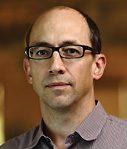
Costolo
Costolo, who was born in Royal Oak, learned to create computer games in his teens. The computer science major began theater classes his sophomore year at U-M to fulfill an arts requirement. By his senior year, he was entertaining fellow students at open mike nights at the Michigan Union.
After earning a Bachelor of Science degree in computer science in 1985 from LSA, he performed improv comedy at Chicago’s Annoyance Theater. He also worked eight years at Andersen Consulting as a senior manager and was part of a team that developed the first Web-based enterprise training application.
He co-founded and sold three companies: Burning Door Networked Media Inc., a consulting firm specializing in Web projects; Spyonit, which notified people when a Web page changed; and FeedBurner Inc., which helped bloggers syndicate content. Costolo also served as senior vice president of MNO Solutions at 724 Solutions Inc., as vice president of product development at Digital Knowledge Assets, and as director of FlowPlay Inc.
He joined San Francisco-based Twitter in 2009 as chief operating officer and became CEO in 2010. Twitter, founded in 2006, has grown under his leadership from 50 employees to 1,300, half of whom are engineers. Twitter has more than 200 million monthly users.
William K. Brehm, Doctor of Laws
Throughout a multifaceted career, Brehm, a U-M alumnus, has applied his analytical skills and visionary leadership to a range of activities, from engineering and national defense to medical research, education, worship and the arts and music.
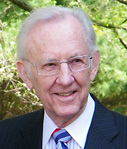
Brehm
Born in Dearborn, the Dearborn Fordson High School graduate and recipient of the Regents’ Alumni Scholarship earned his Bachelor of Science degree in 1950 with honors and a Master of Science degree in 1952, both in mathematics. In graduate school, he was a research associate at U-M’s Engineering Research Institute at Willow Run. That experience led to 12 years in the aerospace industry, followed by 10 years of government service, where, as a presidential appointee, he served Presidents Johnson, Nixon and Ford and five different secretaries of defense.
In 1978, he co-founded SRA International Inc., an information technology and strategic consulting firm, and served as its executive chairman until 2003. He and his wife, Delores, have created centers — focused on medical research, worship and the arts, and special education — at three institutions.
Today, U-M scientists conduct type 1 diabetes research at the William K. and Delores S. Brehm Center, located in the W.K. Kellogg Eye Center’s Brehm Tower. The couple also endowed two U-M professorships in medicine. In 2007, Brehm formed a coalition of nine senior scientists in immunology and cell biology from eight major universities who now collaborate, rather than compete, in their search for a diabetes cure.
Brehm also has served as a trustee and board chair of Fuller Theological Seminary, a nondenominational institution with more than 4,000 graduate students. The couple founded the Brehm Center for Worship, Theology and the Arts at Fuller. At Eastern Michigan University, the Brehms established the Delores Soderquist Brehm Center for Special Education and Research. They also have funded scholarship programs at the three schools.
Suzanne Farrell, Doctor of Fine Arts
In a career spanning more than half a century, classical ballerina and teacher Suzanne Farrell has thrilled audiences and inspired students with her artistry. The former principal dancer with the New York City Ballet remains devoted to the art form, sharing her knowledge and vision as director of The Suzanne Farrell Ballet at the Kennedy Center in Washington, D.C., and as the Francis Eppes Professor of Dance at Florida State University.

Farrell
Born in Cincinnati, Roberta Sue Ficker discovered what would become her stage name in a telephone book. Farrell studied ballet at the Cincinnati College-Conservatory of Music and the School of American Ballet before joining the New York City Ballet in 1961, the youngest ballerina in its history.
George Balanchine, the New York City Ballet’s co-founder and ballet master, described Farrell as his muse, acknowledging her significant influence on the many ballets he choreographed specifically for her. Tall, powerful and fearless, she pushed the physical limits of the female dancer.
She also performed with Maurice Béjart’s Ballet of the Twentieth Century in Brussels, Belgium, from 1970 to 1975, before returning to New York. Reunited, she and Balanchine collaborated on “Chaconne and Vienna Waltzes,” among others, and his final masterpiece, “Mozartiana” (1980), before he died in 1983. Farrell retired from the stage in 1989.
One of the missions of The Suzanne Farrell Ballet, founded in 2000, is to share rarely seen Balanchine ballets. In 2003, The Suzanne Farrell Ballet delighted University Musical Society audiences with its performances, staged as part of the university’s 300th anniversary celebration of the founding of St. Petersburg, Russia, Balanchine’s birthplace. Farrell also participated in the symposium “From the Mariinsky to Manhattan: George Balanchine and the Transformation of American Dance” and has conducted residencies in Ann Arbor.
Rosabeth Moss Kanter, Doctor of Humane Letters
Kanter serves as the Ernest L. Arbuckle Professor of Business Administration at the Harvard Business School, where she is renowned for her influence on the fields of organizational change, leadership, global competitiveness and innovation.
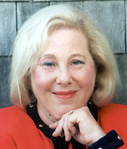
Kanter
Born in Cleveland, she earned her Bachelor of Arts degree in 1964 from Bryn Mawr and a Master of Arts degree in 1965 and a doctorate in 1967, both in sociology, from U-M. Before joining the Harvard Business School faculty, she taught at U-M, Brandeis University, Harvard University and Yale University. She also was a fellow at Harvard Law School, where she simultaneously held a Guggenheim Fellowship. She was editor of the Harvard Business Review from 1989 to 1992.
In 2005, she co-founded and continues to serve as chair and director of the Harvard University Advanced Leadership Initiative. She also co-founded the consulting group Goodmeasure Inc. and has authored or co-authored 18 books and scores of articles. In her monograph “Work and Family in the United States: A Critical Review and Policy Agenda” (1977), she laid out proposals that influenced research and policies on work-life issues for decades and inspired the Alliance for Work-Life Progress to create the Rosabeth Moss Kanter Award for Excellence in Work-Family Research. Her landmark study of tokenism, “Men and Women in the Corporation” (1977), won the Society for the Study of Social Problems’ C. Wright Mills Award.
The Financial Times recognized “The Change Masters” (1983), about organizational structures, cultures and strategies, as one of the most influential business books of the 20th century. Her best-selling book “Confidence: How Winning Streaks & Losing Streaks Begin and End” (2004) focuses on the culture and dynamics of high-performance organizations. The video “A Tale of ‘O’: On Being Different,” based on her book (1979), is among the world’s most used diversity tools.
Amazon.com selected her most recent book, “SuperCorp: How Vanguard Companies Create Innovation, Profits, Growth, and Social Good” (2009), as one of the 10 best business books in 2009. Her follow-up article, “How Great Companies Think Differently,” won the Harvard Business Review’s 2011 McKinsey Award.
Kanter will be the keynote speaker at Rackham’s University Graduate Exercises May 3.
Dale E. Kildee, Doctor of Laws
Throughout a long career in the state Legislature and the U.S. House of Representatives, U-M alumnus Kildee has displayed courage, integrity, a strong work ethic and a commitment to bipartisanship. He advanced educational reform, stood up for the domestic automobile industry and Native Americans, and championed the rights of American workers.
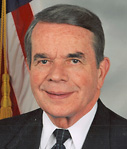
Kildee
Born in Flint, he earned a Bachelor of Arts degree in 1952 from the Sacred Heart Major Seminary in Detroit, and a teaching certificate in 1955 from the University of Detroit Mercy. He taught at the University of Detroit High School from 1954 to 1956 and at Flint Central High School from 1956 to 1964. Kildee studied political science and history at the University of Peshawar in Pakistan under a Rotary Foundation Fellowship, and earned a Master of Arts degree in education in 1961 from U-M.
His political career began with his 1964 election to the state House of Representatives, where he served until 1974. He was elected to the state Senate in 1974 and the U.S. House of Representatives in 1976. After 36 years in Congress, he chose not to run for re-election in Michigan’s 5th Congressional District in 2012.
Kildee was the second-most senior Democratic member on the House Education and the Workforce Committee and the Natural Resources Committee. As chairman and then ranking Democrat on the Subcommittee on Early Childhood, Elementary and Secondary Education, he fought to ensure that American children compete successfully in a global economy.
Kildee has been a loyal friend to the university, especially UM-Flint. Many students have gained valuable experience as interns in his offices. He also secured federal funding for important initiatives, including a 2008 Department of Health and Human Services grant that helped train UM-Flint students for health professions. He co-chaired the Auto Caucus and founded and co-chaired the Native American Caucus.
Kildee’s foreign policy outlook was expanded by his experience studying in Pakistan, which he credits with giving him insight into Islam and an understanding of the history and beliefs of the Shiites and Sunnis. Domestically, he provided critical support for the 2010 Patient Protection and Affordable Care Act. Always conscientious of his voting responsibilities, Kildee rarely missed a roll call vote. He maintained a 99.9 percent voting attendance record, the highest of anyone in the House of Representatives.
Kildee’s degree will be awarded at the UM-Flint ceremony May 5.
David McCullough, Doctor of Humane Letters
Widely acclaimed as a “master of the narrative history,” best-selling author McCullough twice has received the Pulitzer Prize — in 1993 for “Truman” (1992) and in 2002 for “John Adams” (2001).
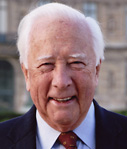
McCullough
Born in Pittsburgh, McCullough graduated with honors in English literature from Yale University. His first book, “The Johnstown Flood” (1968), told the story of the loss of more than 2,000 lives in Johnstown, Pa., after a dam collapsed in 1889. “John Adams,” his powerful, epic account of the life of the United States’ second president, is one of the most praised and widely read American biographies. More than 3 million copies are in print, and it is in its 82nd printing. The HBO mini-series “John Adams,” which was based on McCullough’s book, was one of the most acclaimed television events of recent years.
His book “1776 “ (2005), about those who marched with General George Washington, is considered “a classic.” McCullough’s most recent book, “The Greater Journey: Americans in Paris” (2011), a New York Times best-seller about American artists, politicians, writers and others who visited Paris between 1830 and 1900, has been described as “dazzling,” “an epic of ideas … history to be savored.”
McCullough’s work has been published in 15 countries and, in all, more than 10 million copies are in print. In addition to being a prolific author, McCullough is an essayist, teacher, lecturer and familiar presence on public television, as host of “Smithsonian World “and “American Experience,” as well as narrator of numerous documentaries, including Ken Burns’ “The Civil War.” His also is the narrator’s voice in the movie “Seabiscuit.”
Jeffrey D. Sachs, Doctor of Science
One of the world’s most influential economists, Sachs is director of the Earth Institute at Columbia University, where he also is Quetelet Professor of Sustainable Development and professor of health policy and management.
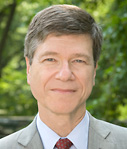
Sachs
Recognized internationally for his promotion of sustainable development, he is a trusted economic adviser to heads of state and governments. He also is a special adviser to United Nations Secretary-General Ban Ki-moon on the Millennium Development Goals, the internationally agreed upon goals to reduce extreme poverty, disease and hunger by 2015.
Sachs, a Detroit native, received a Bachelor of Arts degree in 1976 from Harvard College and a Master of Arts degree in 1978 and a doctorate in 1980, both in economics, from Harvard University. He joined the Harvard University faculty in 1980 and was promoted to full professor in 1983 at age 28. He directed Harvard’s Center for International Development and was the Galen L. Stone Professor of International Trade before joining Columbia as director of the Earth Institute in 2002.
There, he helped design Columbia’s doctorate in sustainable development and championed the creation of the new master’s degree in development practice. Early in his career, Sachs focused primarily on macroeconomic policy. He helped Bolivia, Brazil and Peru, among others, end hyperinflation and renegotiate their debt.
He helped guide many Eastern European countries, including Poland and Russia, as they transitioned from centrally planned to market economies. In recognition of his contributions, Russia’s Leontief Centre awarded him the Leontief Medal, and Poland’s government presented him its Commanders Cross of the Order of Merit.
He also has assisted China and India in their economic reform efforts and was recognized with the Padma Bhushan, one of India’s highest honors. Sachs’ pioneering ideas on investing in health to fight poverty have been applied widely across the developing world.
Sachs has authored or co-authored hundreds of scholarly articles and three New York Times best-sellers: “The End of Poverty: Economic Possibilities for Our Time” (2005), “Common Wealth: Economics for a Crowded Planet” (2008), and “The Price of Civilization: Reawakening American Virtue and Prosperity” (2011). His syndicated column appears in newspapers in more than 80 countries.
Sachs’ degree will be awarded at the UM-Dearborn ceremony April 28.

